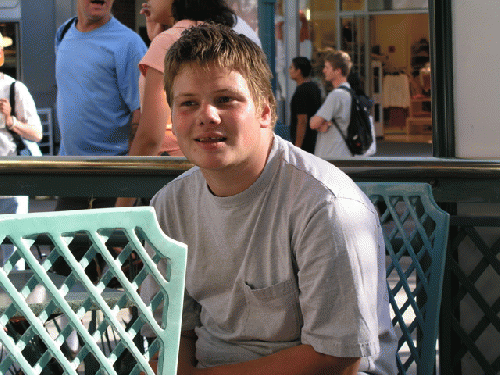
My son, Dar: Sensory issues hurt him, but we try not to
(Image by Lynette Louise aka THE BRAIN BROAD) Details DMCA
Often we read about the
anxiety inherent in autism and the sensory-processing issues of the disorder
but seldom (if ever) have I come across an explanation of how the processing
issue recreates the childhood from one of support into one of abuse even when
the people around you are supportive and kind.
Understanding this is the secret to understanding that anxiety isn't inherent in autism whereas confusion is, and that creates anxiety.
Case-in-point one: A child had an exaggerated startle reflex because his peripheral vision was processing incorrectly and people just "JUMPED" into his eyesight from out of nowhere. Imagine a car showing up in your blind spot just as you try to go into that lane. And now remember the adrenalin rush of danger processing that accompanies the close call to hyper alert you to the situation . Now multiply that by thousands of times per day. If you lived with this problem it would ease your stress and fear to shut out others and keep control of what you took in visually. It would also make the world confusing, because though your brain signals danger and you feel afraid nothing bad really happens. So you are abused by your own brain and every one around you--regardless of kind intent--feels bad to be around.
Case-in-point two: A boy heard everything backwards that came in the right ear, and in a typical fashion as it came in the left. In an effort to adjust for the cacophony he favored people on his left and felt attacked by people on his right. Many of his school mates became his bullies because he thought they were trying to make him crazy, making fun, jeering crazy noises at him, and since people never stay on only one side of you, even his friends became his enemies. He was otherwise bright but this sound confusion left him in a state of feeling attacked by everyone, and his understanding of why he felt how he felt matched his experience of childhood, but no one else's experience of him. He became angry and bullied others because while he was "in charge" and while he was the one doing the talking the words were congruent and his perceptions felt right.
It is not about becoming un-autistic or declassified or recovered because you can handle school and pass some tests. It's about feeling comfortable in your own skin, with your family and within the world, so that you can have a good childhood.
This is the awareness I would like to bring to Autism Awareness month: That sensory issues blended with cognitive-processing problems create an inner climate of abuse. Please don't add to it.





